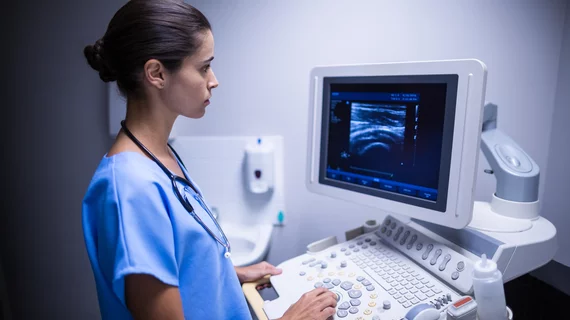Hands-on MSK ultrasound workshops increase skill acquisition, retention
Hands-on musculoskeletal (MSK) ultrasound workshops, utilizing a peer teacher-led small group format, are effective in teaching scanning skills to residents, according to new research published in Academic Radiology. This method helps residents acquire and retain skills, while also improving confidence when performing and interpreting such exams.
The rising demand for MSK ultrasound has increased pressure on radiology residency programs to ensure trainees graduate with sufficient skills, according to the researchers, led by Netanel Berko, MD, of the University of Pennsylvania in Philadelphia.
However, not all radiology residency programs are providing adequate training in MSK ultrasound—and recent survey results show those institutions who do not teach MSK ultrasound are less likely to do so in the near future.
“Radiologists' market share of musculoskeletal ultrasound has plummeted from 65 to 37 percent over the past decade, and if the discrepancy between radiology trainee proficiency and non-radiology trainee proficiency persists, the situation is bound to worsen,” Berko and colleagues wrote.
One solution could include an increase in peer teaching. The researchers sought to design and validate a peer teacher-based MSK ultrasound curriculum for radiology residents.
An MSK ultrasound curriculum with hands-on workshops was designed. Prior to the workshops, resident received three hours of hands-on training in ultrasound scanning, which was overseen by an attending radiologist, who led hands-on scanning during the workshops. Participants were asked to perform diagnostic ultrasound exams to assess skill acquisition. After two months, they were tested for skill retention during ultrasound exams.
The four workshops included 37 residents from all years of training and six senior resident or fellow peer teachers. Diagnostic ultrasound images were obtained 100 percent of the time immediately after the workshop and 79 percent of cases two months later.
To assess knowledge acquisition, residents completed a 20-question multiple choice exam and also subjectively assessed the curriculum using a five-point Likert survey.
Prior to the workshops, residents reported a low level of MSK ultrasound knowledge and low confidence in performing and interpreting MSK ultrasounds—all within an interquartile range of 1 to 2. Post workshops, there was an increase in knowledge and confidence in performing and interpreting MSK ultrasounds. The average score on the multiple-choice test prior to the start of the curriculum was 57.0. Following the conclusion of the curriculum, it was 73.9.
“It is notable that while the skill acquisition rate immediately following the workshops was 100 percent, the skill retention rate two months later was 79 percent, and likely would decrease further over time,” the researchers wrote. “Recurrent workshops over the course of training would be useful to reinforce skills and likely lead to increased long-term skill retention.”

